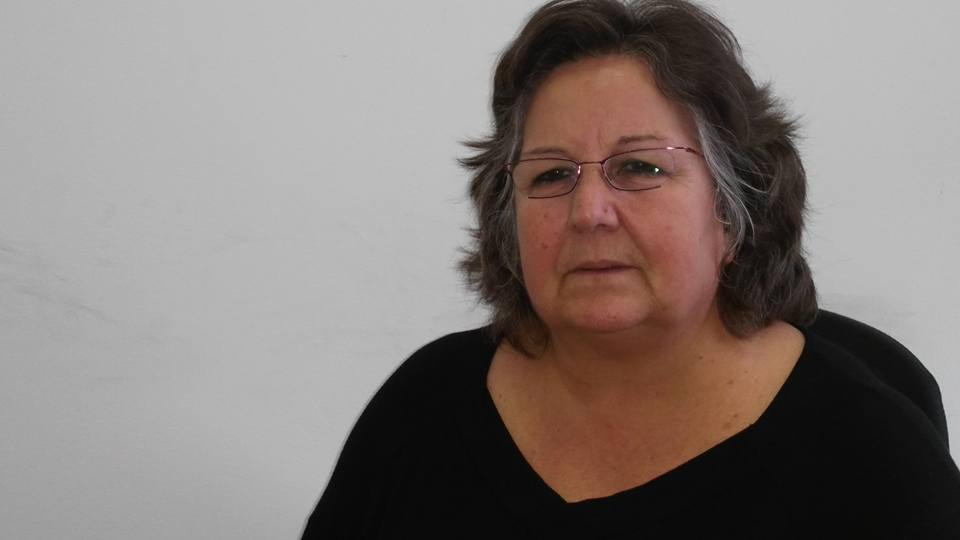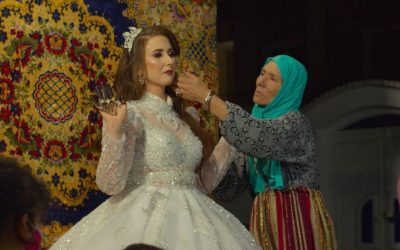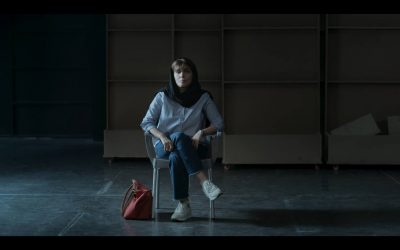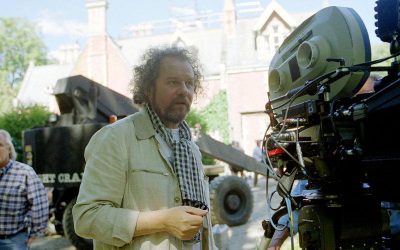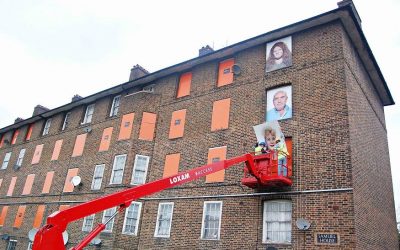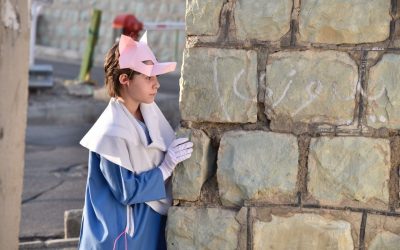By Nicola Pratt
2014
TAPE 1
Nicola Pratt: When were you born?
Arab Loutfi: I was born in Lebanon in 1953, in Sidon, south of Lebanon.
NP: Did you grow up in Lebanon?
AL: Yes, I grew up in Lebanon. And… I only came to Egypt… and I used to come to Egypt when I was a child because my sister… my elder sister was living here. So I’m very much in Egypt. But I… actually, first time I came to settle for some time it was in 1972, to study cinema but I used to go and come to Beirut. And then I went back to Beirut in 1976- in 1977 during the war, then I came back to Egypt in 1982. So since 1982 I settled in Cairo more. But I mean all the … but all the time there’s something between Cairo-Beirut or Lebanon and Egypt. I’m moving around. here and there.
NP: Your parents are Lebanese?
AL: Yes, my parents are Lebanese. Yeah, yeah, I mean… It was something really… I mean, maybe… Egypt, somehow was in a way… the people never felt that it’s another country. You know? We have this kind of… it’s like as if Cairo is the capital of the Arab world, not only Egypt. Do you know what I mean? And there was this kind of familiarity with moving around, you know? It’s not that you’re going to another country. It’s as if you’re moving in the same… It’s something people don’t understand if they didn’t live in this area, somehow. Actually, this is why you find that many… many fields there were lots of Lebanese, Syrians, Iraqi who lived in Egypt. Who were part of the Egyptian community. Anyone who is informed, he knows that. In literature, in art, in everything. What do you want me to do?
NP: Can I ask, what did your parents do?
AL: My father was a lawyer and he was in the judicial system after that… He began as a lawyer then he was like, this kind of like… what do they call it? The Higher Judicial Institute. What do you call it in England? I don’t know. In Lebanon they call it the Appeals Court. Where they file appeals. It’s the highest court.
NP: The highest court.
AL: Yes, so, he was in that … in the judicial system but he was a very progressive person actually. He was very open minded, very much… very open minded… very patriotic in a way, at the same time he was more affected by very … you know, if you can call it liberal left ideas. And he was very… believes in equality, pro women, believes in… he’s against injustice. He’s with socialism in a way but in a very reformist way. Not radical, like reformist. Yeah. And my mother was a very open minded woman, very strong character. She didn’t work but she was a very… very strong presence. She has her own strong presence. Can I talk…. (inaudible) I mean I was brought up in an open minded house. Relaxed. Also interested in culture and arts, movies, everything. I mean it was really a very relaxed atmosphere to grow up in.
NP: What’s your earliest memories … most vivid memories of events happening in Lebanon? Political events?
AL: Look, where we grew up with … in politics. I mean I’ll tell you since I was a child. Because… My brothers and sisters are older than me. They’re… the youngest is seven years older. And others 10, 15, 17 years older. I grew up they were already active and at At the same time my father was very much into internal politics. At that time also the anti-colonialist movement was very strong in our area and also, you know there was the occupation of Palestine and so… it’s kind of… all the movements started or the rights… for return of the Palestinians and to liberate Palestine and at the same time there was The socialist movement is growing also. So I was living in this atmosphere of who …. I’ll tell you something very interesting because, I already grew up in a very liberated atmosphere that, even when I began to cope with ordinary people… the people who are living within the system, I was always getting chucks (??) because, for example I knew that women are equals and then we discovered that people who are dealing with women are not equals. You know, for me, the discovery was the opposite. It’s not I’m discovering liberation it was, we are in an atmosphere of people who all think in an open minded way and then, through my friends in school or through people I met in In many places, you begin to discover that there are people who think differently. To feel very strange that it’s … why they are thinking that way. You know, it was… and actually that was very good in a sense that I mean, It’s not that I was fighting for new ideas but I’m not sure if they can be … if they can be…realistic. I always knew that you can live as a liberated person. This is why for me it was more shocking why people refuse this. you know what I mean? It gives you more strength in a sense that really, you’re sure that people can live in a different way, they can deal more relaxed and as many women are class wise or even, for example, in our house, there were no discrimination attitude between classes. So when you find people dealing in a different way you feel it’s very strange. I mean… I was in a very… in an atmosphere that helped me to develop in a healthy atmosphere for thinking and so on. And then, when I was 13 actually, 1967 war happened and the resistance began and so there was also the resistance movement, which added to this kind of equality relations. People became more rebellious against oppression in the camps in the popular areas. The students and so there was an atmosphere of rebellion. And this built so much freedom for the society. Actually, my youth, till the late twenties, in a way, I was living within the context of a very… I want to say something. There was a strong movement at that time but the movement was more optimistic in the sense that there was a certain belief that the struggle is going on, that there’s anti-imperialist emotions and anti…. There are socialist attitudes but people believed at that time that we are going on the… moment of change. The people believed that there would be victory. And so, till the… late 1970’s, the whole atmosphere… I lived in an atmosphere where there was a certain positive attitude toward the change. People were more assured, more relaxed with their ideas and also more relaxed with the feeling that a different society can be built easily. And, actually, we were believing at that time as if all these actionary (???) regimes are just… it’s their final moments. Of Of course, the defeat in 1982, distracted all this attitude. There was a big change after it. Because, the defeat of the resistance in Lebanon, the Israeli occupation, then the Soviet Union failing, then all the change in Eastern Europe, A different era began. people… there was something that… as if it was lost like an earthquake in 1982. At that time of the… So, the atmosphere I grew up in it was full of struggle but the struggle was people were in a moment of real change. This is why, now, when I see the young people, they’re very optimistic, which is very good, and you feel that they believe that the change will happen you know? I mean, and I… I’m very sympathetic with this but you know, people, I feel they should be more aware of what’s happening around because it’s not only this picture. we have to see …. That’s it. I grew up at that time. I was… whether in Lebanon or in Egypt there was a political movement. In Lebanon there was the resistance movement. It was more organized, more military also. And the struggle was more… more violent in a sense. In Egypt it was more a popular movement but there was a big link at that time between the two in the struggle. Of course, there was a big link, until now there’s a big link between anti-imperialism and the struggle for socialism for the socialists, like me. I… we believed in a… that we can’t achieve a real socialist society with justice and… without defeating imperialism. And this caught on to with many groups who are not really socialists but at least they were anti -imperialists in that sense and they wanted a chance for liberation, for change. Till now, this problem is going on now but it’s becoming more complicated because of the world wide economy is becoming more complicated, imperialism is becoming more complicated by the way… I I think you feel it even in England. It’s not the same simple story of struggle between classes then… It’s getting very complicated … network of interests that interacting in a way that you feel that in a way, Saudi Arabia is somehow inside… into the Israeli… into the American. You know, it’s no more… I’m talking outside… That’s it. What do you Want more?
NP: Did you participate in the movement in Lebanon?
AL: Yes, of course.
NP: How?
AL: Yes, I was, from the beginning, since I was 13-14. I joined…. I was in the beginning with the Marxist group, Lebanese, then I became part of Marx… I mean, left wing of Palestinian resistance. Yeah, and… I was always on the left, I was always organized. I was in the organized movement all my life, nearly all my life. Even when I’m not in something now, it’s just because you need to find what’s going on. But I believe that… I I believe that an organized movement is very important to change. You can’t work alone independently as a human being without being part of a movement. Maybe now, there are discussions… what kind… how movement. How can movement’s change from what’s going in the sense of learning from old mistakes and trying to build something different. But definitely people need to organize. I agree with this completely. And I.. for me …. it was… change is part of my life. For me I believe that politics is … I am in a way a political animal (??) Even when I work cinema, even when I work teaching, when I work with anything I’m always …. I have to see it through political things because our lives was politics. I mean we never lived a normal life because we… for example Lebanon was part of Big Syria, Big Syria was Palestine, Lebanon… suddenly they cut old Syria into different countries so you find yourself there’s Lebanon there’s … and then Palestine was taken by the Zionists and then you find that this affects your daily life by the way in so many ways. People change destinies. And so you can’t be … you can’t deal as if you’re outside politics. It affects your social life, economic life, your relations with people, it divides countries, it divides families, and then you find that more and more and more they’re cutting the area into pieces. Now, we, for example, in this area, we don’t have any country that you don’t have borders closing and not only that. For Arabs, it’s more difficult for Arabs to move between Arab countries than an American to move into an Arab country. For example, if I want to travel now, you find for Saudi Arabia you I have to have a visa, for, I don’t know… Emirates you have to, for Syria, for Lebanon, People don’t feel… the area is fragmented and you are trapped inside walls. And it’s getting… it’s becoming claustrophobic. You know, this area. It affects our lives. You feel Of course, I was always in politics, I was always in the movement, I was.. I never worked in something independent from others. When I’m working on the women’s questions it’s related to the whole of politics, not only women. If I’m working on the working class movement or popular movement you link this and relate it to the whole map of politics. You can’t even put yourself in one category. You are in all these categories, inside it. Yes, come on. No, I think once I wrote something related to cinema by the way, like … something.. she was making a book about women but I mean I wrote certain testimony about how I grew up and so on. It’s in English I can send it to you by email. I have your email, yes.
NP: I’ll give it to you at the end just in case.
AL: Yes, you sent me an email
NP: No, I called you.
AL: No? No, you called me. Yes. So I’ll take your email and send it to you. Yeah, because I I mean, there’s certain things like… reading how I began by beginnings in relation to … Also, I wrote something about trauma and cinema in relation to my country but this is in Arabic. You don’t read Arabic?
NP: I can read Arabic
AL: I can send it to you. Yeah. That was for Alive, the.. I don’t know. But I mean because It was about trauma and cinema. How it affects your relations in our family (???) It touches this area (??) When you are in a certain society, how all … you can’t have your own ideas without linking to what are the traumas you’re living inside. Yes. What do Do you want to know more?
NP: In 1972, you came to Egypt for cinema school?
AL: Yes, I came to cinema school and at that time I was in the Lebanese political movement and then here I began to become linked to the student movement in Egypt and I was part of the political groups that were there. There was very high relation between Lebanese, Palestinian and Egyptian left wing groups in a way. There was an organized relation. So I was active within this movement. It was more… at that time it was a secret movement. It wasn’t … it wasn’t like now. I mean most of the organizations were secret organizations. And actually this is why in the late 1970, after Camp David … I was … they wanted to arrest me because of this. because of what they knew about me. So I left Lebanon. I wasn’t caught here but I was not… They put me on a blacklist to Egypt. I stayed for about 5 or 4 years. I couldn’t come to Egypt. But when I married my ex- husband, because he’s Egyptian, they had to allow me in as the wife of an Egyptian. because there’s no case. They don’t have a case, it’s information so they can’t … if they don’t want to allow me they have to have a case and they didn’t have.. there was no case, so they had to let me in. But they began stopping me every time and I asked me. They called me for interrogations and every time… it was not settled till I got my Egyptian citizenship. After getting the citizenship they can’t continue doing that because Now you’re Egyptian. So… and then it went… and also there was a political change also because… That’s when things changed and… so I settled, I was in Egypt after that. I have two nationalities Egyptian and Lebanese. Since 1984 I think.. 1983-1984. Yeah. But.. and I stayed active but changed … even in Egypt there was something beginning to change more and more. Many of the movements collapsed within… after the big political changes. Actually, lots of.. even in Europe I think this happened. Many leftist groups became more fragmented. Different points of view about this and there was a big struggle here about how to continue. There was this new liberal era and many began to … many of the old left became … many of them linked some way or another to the regime in different ways. Some people became more linked to the NGO system, which is very much related to the West in a way and also, it was a way to corrupt leftist movements. Many stopped being really radical. They used the same language to work on different levels. And… Something changed in the whole struggle. Many people were now.. what we call old groups old (??) became more into struggle into each other’s points of view. Until now it’s going on. But now more and more, now something new is growing which is… Now something new is getting… being born but still not developed. A a new movement is now going on. Without the distractions of the last movements. I think what really was important that… before the revolution in Egypt … one or two years before something was going on and growing. and really it developed and flourished in a way after the 25th… I don’t believe that after the revolution the first and the second is a big change in the system but there’s a big change in the political movement. The big change in the popular movement. This is what’s so positive about what’s happening… that now there’s a new popular movement developing and this is what will make the change afterwards but the change didn’t really happen in the … in the system itself. There’s no change of regime but there is a change of the political power of the people. which will affect any kind of regime that will come now. To what extent? What will What happened? Still we’re seeing it. Ok, what do you want to know?
NP: You were involved in AL-Mar’ah al-Jadeedah. Is that right? Or… in the beginning…

Arab Lotfi
AL: Yes, yes, we were a group of women who were trying to build something more related to the left and actually, in this experience, at that time it was the beginning of the moment of really a struggle inside the left in Egypt. Between different lines. Some of they were related.. they were working … they wanted more to be part of the NGO system. and we thought that this is corrupting the work of the left on the ground and .. which showed out afterwards that it’s true. 90% of those worked in that system they became very corrupt moneywise, politically, socially, even those who didn’t really gain so much money but they changed all their attitude toward the struggle. They became much more into the system. Not only the Egyptian System, the international system. They became part of the imperialist regime …. Actually, the AL-Mar’ah al-Jadeedah it was one of so many things that were going on supposedly the left was working on and it was corrupt with this struggle. Not only AL-Mar’ah al-Jadeedah, by the way. Even there were many groups who used to work for … all those who afterwards opened … we call it shops for human rights and legal rights and others. It depends on the agenda every year. Because every change of agenda you find people opening new NGOs. For example now the agenda is to work for… against Khitan al-Nisa2 (Female circumcision) You find suddenly all the NGOs are working on this. Now harassment so all the NGOs are working on this. Because money comes faster for these agendas. I mean it fragmented the movement and it put only… and actually… it did something very dangerous, linking the activists to .. it became as if… some activists became … begin enthusiastic to do the work and then afterwards they become like employees. It becomes their livelihood. bit by bit you just corrupt the relation with the struggle itself. because it becomes… AL- Mar’ah al-Jadeedah was one of many that… But the struggle was, at that time very aggressive because actually the … some of us who wanted to get funds … they did it behind our back and we discovered that they were taking money by our name without our permission and we were against it. but we were the majority. We thought it was very unethical in fact. it’s not only corrupt, it’s unethical. For example, if we don’t agree on something we can split and each one can do what he wants but to do it with my This is very corrupt and very unethical. This is why the fight was very aggressive. and so, the people didn’t… we’re not on talking terms till now. You feel someone like a traitor. he.. although you sometimes work with groups that are different. Each one … It’s not very important … by itself it’s not the story. The story was the whole atmosphere. But it was very significant at that point. Actually, really, most of the people that are in it became we call them small shops. you know that? Yeah. So, it was something, but I mean that … it was one of many things we were doing at that time not only.. even, by the way that happened in the solidarity group.
TAPE 2
Arab Loutfi: … group. Many of the solidarity groups … people just used connections to make offices for work to get funds for legal things. Everything was beginning to change into a system of … it’s part of the capitalist system. They became part of the Capitalist system. Just jobs inside this system. And still going on till now. You find this and that and this and that. Yeah, but I mean what’s going now, I think I believe what’s happening Now, more and more people are becoming more critical towards this attitude. Something reviving more … people are trying to be more into the struggle not … because I believe that this kind of corruption it’s part of the defeat of the leftist movement. It was part of the defeat. The moment a movement reconsider its strength and developed people can fight these kinds of corruption. Like what happened everywhere. Even in universities, even in cultural life. That’s it.
Nicola Pratt: During the … the period in which … that there was student movement and there were (??) There were leftist movements there… before the fragmentation, as a result of NGOs, but were there different ideological orientations? Different leftist groups?
AL: Yes, of course. There were, some groups were more Marxists (??) oriented toward socialism and to struggle against…. linking very much anti-imperialism with radical change in the social structure of society. Working more for more democratic socialist things. Some groups of the leftist were more anti-imperialist in the sense of more critical to the role of imperialist … imperialism in the Arab area, and so they can link more to what they call nationalist regimes or any nationalist movement, even if they don’t have the orientation of the left but they believe that the independence is very important for liberation. You were different… and until now it shows very much in the movement. For example, you find people who are more keen on the idea that you can alley with even sometimes with certain conservative groups or classes if they are anti-imperialism. Other groups see that even if I’m aligned I have to be very critical and very… not to be .. you have to be all the time very critical about this because it will lead us back to this kind of control system. You still have this… for example, you find left wing they are more into .. they are more populist sense of you know, struggling for the movement, for the people, for (??) the end but they… the Independence day, the army (??) More the Marxist groups are more into that your country built a strong state with an oppressive system. And so you have to build a popular democracy. and so you struggle more for popular democracy not for the control of the old regime or any kind of system, very strict system. You have these differences on the left. and actually you find it till now in the movement between the people in the Maghreb or Tahaluf Sha’bi or (??) Marxist. For For example, there is this, how they read the Islamist groups. For example, most of the radicals see that they are a fascist, that the Islamists are part of the fascist imperialist project of the area. and so you have to really eradicate it completely because it’s like Nazism in Germany. But also, with .. it’s also aligning completely with the Israeli- American … to segment the area into religious entities and so on. While some groups in the left, they deal with it as if it’s just like the army. Which is nonsense to me.
NP: Just like what?
AL: They deal with it like it’s just reactionary. For example, that Sisi is a reactionary which is not the case. Because, there’s a big difference between certain, old classes … conservative old class between really a group that are really fascist, racists, anti… they hate women and they hate Christians and Muslims from other sects. They hate the people if they are not Muslims like them. And they are ready to fragment the area just for their control. And they are aligning with the Americans, they are aligning with.. They are completely … it’s a destructive fascist … you can’t be… for example, now there is a big struggle, even on the left. There is a big quarrel about this. Between people who are fighting … dealing that we have to finalize, eradicate the Muslim Brotherhood and the The struggle is continuing with the old class. but, it’s very dangerous to have Islamists you know? While some other groups are dealing as if they can even be sometimes aligned with the Islamists. (??) Civil society group. which is dangerous and we’re not ready to have it again because of the era, not only Egypt. Egypt, Syria, Iraq. the whole region is disintegrating and…. they are destroying the region so it’s not… It’s really destructive. and they are trying to fragment the area into entities, religious entities. And Israel is the only side that benefits from this because in the end you are building … I mean if you accepted the idea of religion .. you’re giving Israel the right to exist. And with this we are building fascist… a fascist system for the whole area. The chiefs… the chiefs of tribes want to control people in a fragmented area. Very dangerous. I can’t compare them with an old class. No, really, even in one state … it’s like if in Germany … people who tried to say that the social democrats are like the Nazis. They’re both part of the burgoos. This is bull shit. And, not only Germany, the whole Europe, paid the price for that. They really destroyed Europe. We are not… Europe lost 30 million people … we have… how many? How many are dying every day? In this area, if you go … If we went How many thousands of people will die? 500-600 are dying every day. 300, 20,000. In Syria thus far 200,000 have been killed. It’s very dangerous. So, (??) in the left itself, there are different points of view of course. Even how to deal with the struggle and … actually this is what will build up new alliances afterwards. New alliances are being built. But here the problem is that it’s not really the left. I mean the point is that now you feel that … It’s a political struggle. You can have people with you in the same line from different ideological groups but because they are anti certain… I believe that our area there’s a project, it’s an imperialist project but its working on fragmentation and I believe that any leftist or what they call themselves nationalists, or call themselves Islamists, who are in this project. I believe they are anti …. they are part of the people’s enemy. whatever they call themselves. Because you can talk left but mean right. and actually really I believe that imperialism, part of its … strength in the whole world, not only in our area they built a big click of people with the language of the left who are supporting the policy of imperialism. and you find them in intellectuals, in academics in (??) they use the language to build a different system. it’s not what you say you are, it’s what you… for whose interest you’re working. That’s it. Anything?
NP: I’m interested to know also about, sorry, back to the 1970s and 1980s, was there a feeling also of the generationally difference? Like from the left that had existed before, that there was also a change , were their differences of opinion between the old left and a new left in the student movement?
AL: You mean now?
NP: In the 1970s.
AL: Difference between what and what?
NP: An older generation. Was there sort of like an older left?
AL: Yes, yes.
NP: and…
AL: In Egypt you mean?
NP: yes in Egypt in the 1970s.
AL: Yeah. Look, in Egypt the point is that… Most of the left that developed in the 1970s … it developed after the defeat of 1967. and it … it stressed on the idea… it took from … it became more … The left of the 1970s took more from Nasarism. the deep involvement in anti-imperialist struggle. but actually they were trailing the regime for that … that Why couldn’t you do that? and that built a certain criticism for the regime on the … based on the critique of the old left to the regime about democracy and the control of bureaucracy and corruption and so on. and this is what caused the (???) and if that there was more… popular democratic movement that is able to stop the corruption, stop the … and to rebuild, to reconstruct … it was in a way, the movement of the 1970s… it wasn’t.. it was in a way… benefiting… not benefiting, I mean… understanding.. taking the spirit of the nationalism of Nasser but with a more critical and deep … critique of its understanding of socialism. It could… it based its critique on the old leftist movement I mean. Actually, there was more interaction between the … student movement and the old left. For example you find that many of the movements that were built at that time, many of its leaders who played a role in reconstructing the consciousness of the movements were from the old left inside different parties, In… The Communist party and the Communist Workers party or the 8 January movement … most of these organizations, many of their main leaders were of the old left, which means that the new left was not … was not in cutting with the … you will find Tariq Abd-al-Hakim of * January and many others like Hegiras, The Labor party was Ibrahim Fathi and all the groups were old. Ali Fathallah. So, for something… integrate… it was not… there was no cutting between them. but also at the same time, these young men who joined the movement. They also have a very emotional heritage with Nasserite politics. But actually even the left had it because many of Nasser’s politics was supported by the left for example, the securing of the canal (??) The Suzie Canal. Building the High Dam. The struggle with Israel. fighting anti-Saudi Arabia.. anti reactionary regimes. He, with the external politics they were very much pro the regime and also with some parts of the economical like industrialization but definitely there was a big critique for the whole social structure of the regime and how it built its… And now it’s at its peak… Now this is in its peak. I believe .. I believe that now the real change that will be happening in Egypt through development more and more there’s something developing in the consciousness … there’s deep understanding now for what you call it … a popular democracy. People… for example, for the first time in the Egyptian struggle, during the revolution and afterwards and forward no one is asking for a leader. they are all fighting for a program. people are talking more about programs. more talking about the change … democratic change making laws, changing laws… before that people more always depended on the idea of having .. and this is why I don’t believe Sisi’s story .. it’s all fake In a way, it’s funny… not only… it’s not a matter of … there is a certain majority of people who are not really politicized or they feel secure when they find someone (??) but the majority movement … moving… what you call… the fighting group… what you call…from the people… no more this idea of … the leader. It’s no more there. People all are talking about how to organize, how to deal how to built the laws, how to make the constitution… how to make democratic laws, rights of trade unions, rights of… If you notice all the time, when you talk with people, even ordinary people just like.. you I find everybody is discussing the details of how to build a democratic society. they’re not talking about a person who will lead the people to victory, leadership. Something really deeply changed in the… and I believe that this is part of the deep consciousness that developed after 40-50 years of struggle. people really began to see the world differently Now, the generation now is not like the generation of the 1960s. Even the 196s generation were fighters who believed they are democratic fighters, they wanted a leader. Now people are talking about a system. different system, different relations, different laws. The rights of trade unions, right of such things, They believe what can … their only criteria… The only assurance is … to have a different system. I I believe this is a very big change. By the way this is part of the really very good change in the young people. I believe this is really what’s very important. It’s becoming a part.. integrated in the Egyptian character. Do you know what I mean? Which is normal. ..All countries in the world… France, when they had the first burgoos revolution they got Napoleon after… people don’t grasp the idea of building a system of democracy. It takes generations to understand it because they fight their battles and they… they have to live all the contradictions of the story. You had Cromwell. I mean it takes time people to come to build the ability to understand that they can control through their own system but … but also we have another struggle. this is why it’s more complicated more difficult … because already we’re doing this at the peak of the degradation of imperialism, of the capitalist system. and so you really need not only to reach this but to understand how you can move it into a new system which can surpass this kind of exploitation system. And at the moment, worldwide, imperialism is becoming more and more real destructive. destructive for nature, for human beings, for classes, for everything. Not only poverty. It’s impoverishing everything. Even creativity by the way. Nothing now is really working in the system because it’s only built on money. more and more it’s becoming a predicament. We are in a complicated moment by the way. This is why. Ok. What more?
NP: Unfortunately, we’ve run out of time.
AL: Yeah, yeah, right. We can continue after work. even after work.

